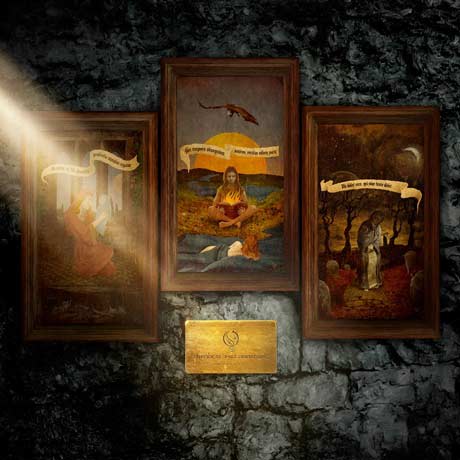There have been numerous glaring indicators of Opeth's transformation from beautiful-yet-brutal death metal band to the less definable "progressive" tag: integrations of folk, lush piano, off kilter time signatures and (gasp) stunning, clean vocals. The definitive break was perhaps the release of Heritage in 2011, the tour for which found Mikael Åkerfeldt deliver not a single guttural howl (to the grumbling of many attendees). That Åkerfeldt's 2014 curation of Roadburn Festival featured Magma, Comus, Goblin and Änglagård confirm it: Opeth are not a death metal band. Hell, they hardly even fit within the metal genre anymore.
Pale Communion is a warm and natural progressive rock album that is beautiful, plain and simple. The arrangements, however, are anything but simple; Åkerfeldt's vocals are gentle and warm, flitting amongst cascading riffs, jazzy percussion and string arrangements that sound Eastern-influenced, menacing and atmospheric at varying points. There is a heightened emphasis on major and minor chord juxtapositions, giving the music increased light and dark/good and evil shading amidst the grandiose, anthemic wall of sound segments and the occasional mellotron.
The tracks run long (nothing below four-and-a-half minutes), and the highlights come for those with patience (the album peaks, like Heritage did, in the latter half); Pale Communion is a grower. One particular element that runs through the entirety of Opeth's discography is copiously present: those ominous riffs and a sense of moody, brooding emotionality. It certainly won't be enough to appease Opeth fans infuriated by Heritage (or, if you go further back, by the polarizing Watershed), but it will intrigue and appease those willing to accept the band's expanded sound.
(Roadrunner)Pale Communion is a warm and natural progressive rock album that is beautiful, plain and simple. The arrangements, however, are anything but simple; Åkerfeldt's vocals are gentle and warm, flitting amongst cascading riffs, jazzy percussion and string arrangements that sound Eastern-influenced, menacing and atmospheric at varying points. There is a heightened emphasis on major and minor chord juxtapositions, giving the music increased light and dark/good and evil shading amidst the grandiose, anthemic wall of sound segments and the occasional mellotron.
The tracks run long (nothing below four-and-a-half minutes), and the highlights come for those with patience (the album peaks, like Heritage did, in the latter half); Pale Communion is a grower. One particular element that runs through the entirety of Opeth's discography is copiously present: those ominous riffs and a sense of moody, brooding emotionality. It certainly won't be enough to appease Opeth fans infuriated by Heritage (or, if you go further back, by the polarizing Watershed), but it will intrigue and appease those willing to accept the band's expanded sound.
